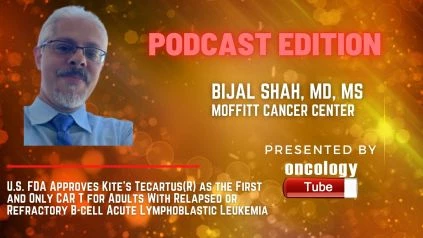Bijal Shah, MD, MS, ZUMA-3 investigator, and medical oncologist, Moffitt Cancer Center, Tampa, Florida speaks about U.S. FDA Approves Kite’s Tecartus(R) as the First and Only CAR T for Adults With Relapsed or Refractory B-cell Acute Lymphoblastic Leukemia.
Tecartus® (brexucabtagene autoleucel) has been approved by the US Food and Drug Administration (FDA) for the treatment of adult patients (18 years and older) with relapsed or refractory B-cell precursor acute lymphoblastic leukemia (ALL). Tecartus is the first and only chimeric antigen receptor (CAR) T-cell treatment approved for adults (18 years and older) with ALL, following FDA Breakthrough Therapy Designation and a priority evaluation. Because half of this patient population will relapse, and the median overall survival (OS) with existing standard-of-care therapy is only about eight months, there is a significant unmet need. Tecartus is available at 109 accredited treatment centers around the United States.
The approval is based on the findings of ZUMA-3, a worldwide, multicenter, single-arm, open-label research in which 65 percent of evaluable patients (n=54) achieved complete remission (CR) or CR with incomplete hematological recovery (CRi) after a median actual follow-up of 12.3 months. For moreover half of the patients, the duration of CR was anticipated to be longer than 12 months. The median duration of remission (DOR) among efficacy-evaluable patients was 13.6 months. Grade 3 or higher cytokine release syndrome (CRS) and neurologic events occurred in 26 percent and 35 percent of patients treated with Tecartus at the target dose (n=78), respectively, and were usually well-managed.
Adults with recurrent or refractory ALL are frequently treated with a combination of therapies, including chemotherapy, targeted therapy, and stem cell transplant. CAR T-cell therapy differs from other cancer treatments in that it uses a patient’s own immune system to attack cancer. The patient’s blood is obtained and the T cells are isolated with CAR T. The T cells are then genetically modified with a specific receptor that allows them to recognize and target cancer cells before being returned to the patient’s body.
Tecartus is also being evaluated for the treatment of adult patients with relapsed or refractory B-cell precursor ALL in the European Union and the United Kingdom.

